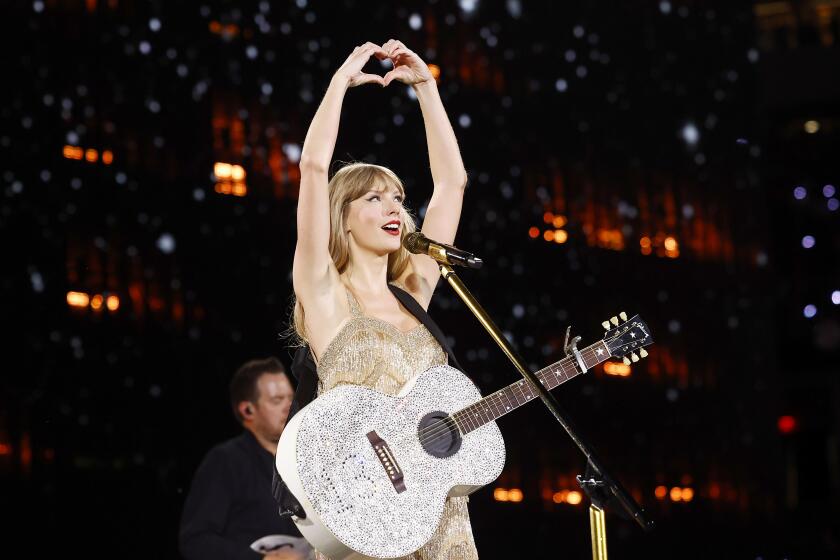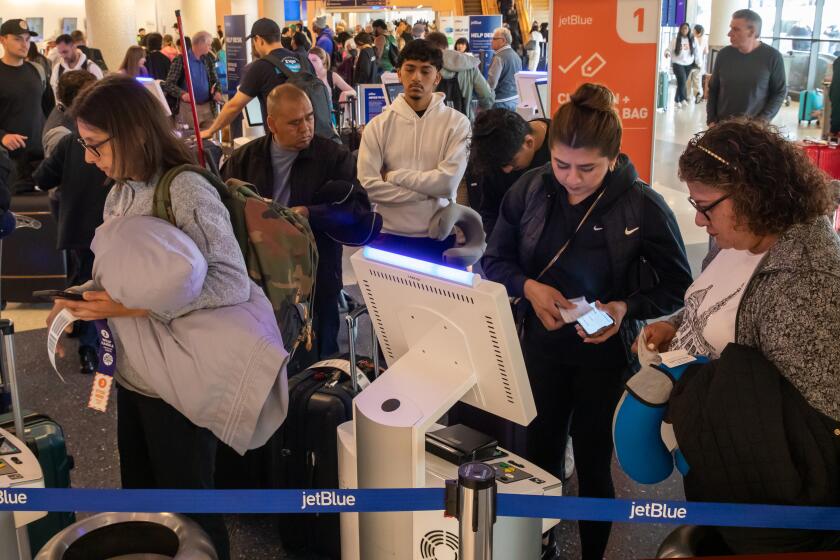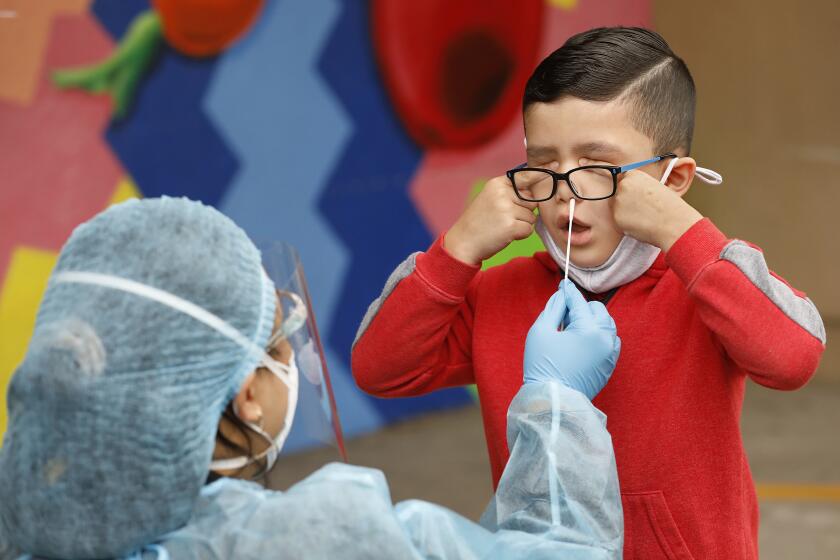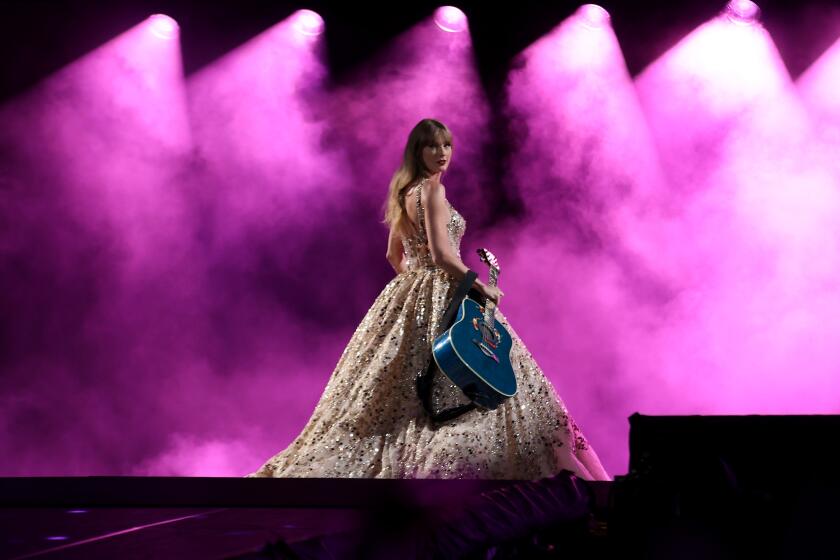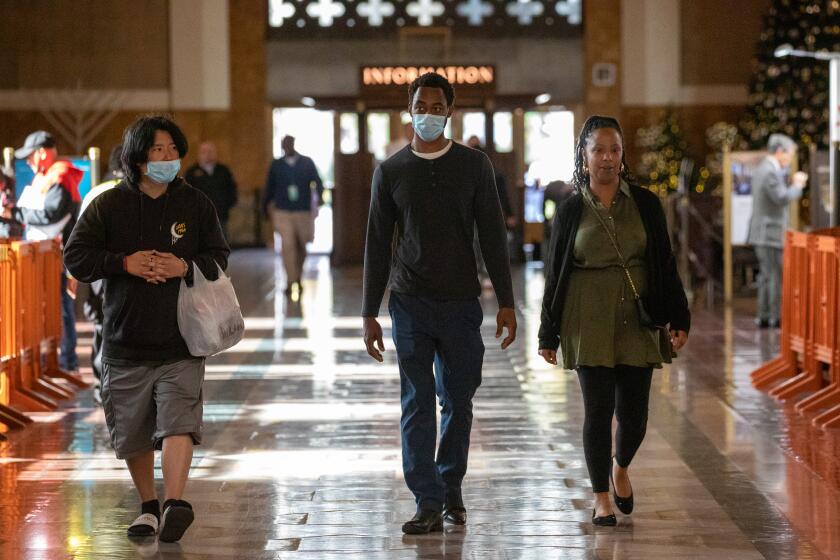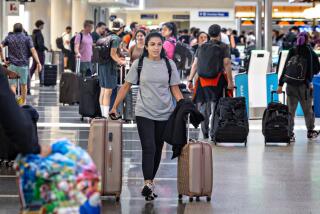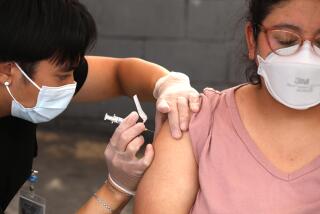Could Taylor Swift mania fuel a COVID cruel summer? What you need to know
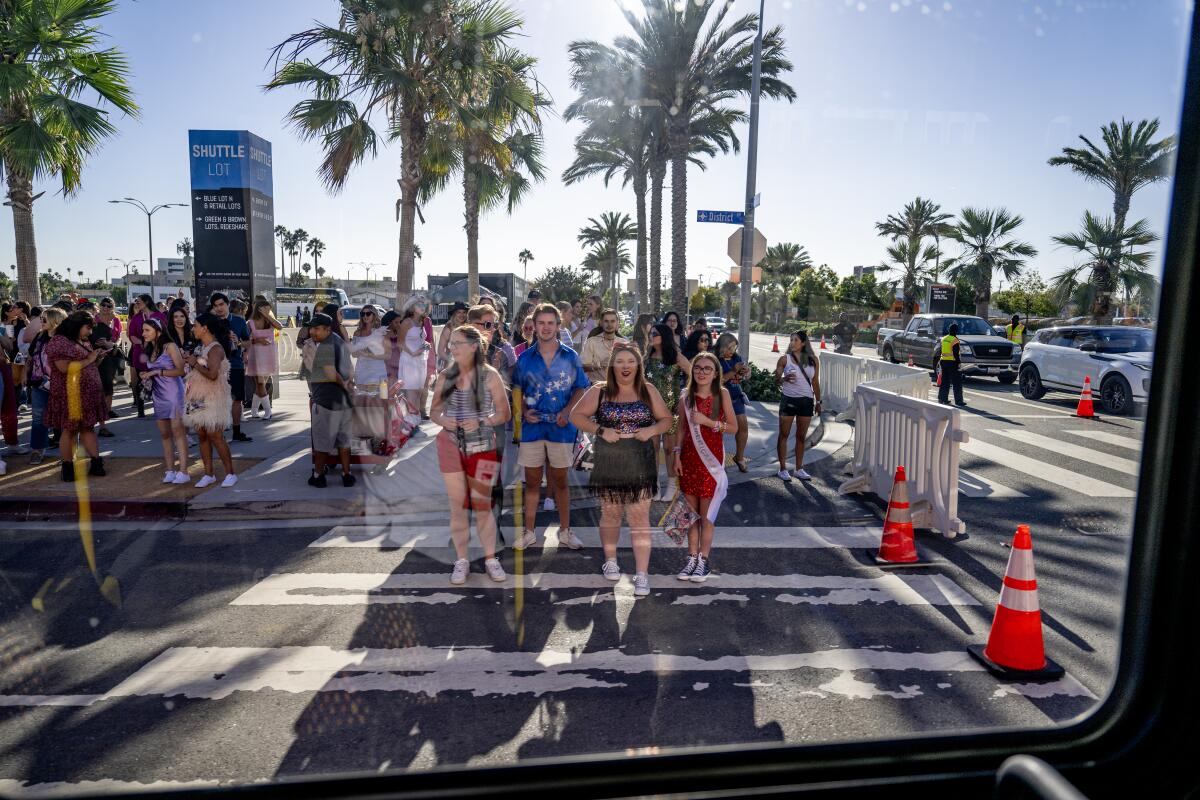
- Share via
Could Taylor Swift’s mega-tour have fans seeing red on their next COVID test?
There has been some cautious optimism among public health officials that this summer might be the first during which California doesn’t experience a major coronavirus wave — and there’s no evidence at this point that one is on the way.
But California is not in the clear or out of the woods just yet. Transmission does appear to be on the upswing, and there’s no denying the virus’ enduring power to spread, particularly in crowded settings. And crowded hardly begins to describe Swift’s concerts, let alone the fan mania that has surrounded them.
“Given the relatively low rate of COVID-19 community transmission, and the ability of everyone to take sensible precautions, we are hopeful the concerts will not significantly impact community transmission rates,” the Los Angeles County Department of Public Health said in a statement to The Times.
Taylor Swift kicked off six sold-out shows at SoFi Stadium, and The Times’ Mikael Wood and Suzy Exposito were there to provide a full rundown.
There have been a handful of reports of coronavirus infections after Swift’s concerts at the outdoor Levi’s Stadium in Santa Clara and elsewhere in recent weeks. But it’s unclear whether those played any more significant a role in terms of spread than other social gatherings or large events, such as the recent San Diego Comic-Con.
The L.A. County Department of Public Health said it has not heard of other areas that have reported a notable increase in coronavirus transmission linked to Swift’s previous stops. Her tour began in March and continued amid a national downturn in COVID hospitalizations — which hit a record low in late June before ticking back upward.
But at this point, with coronavirus case reporting uneven and largely unreliable, it would be difficult if not impossible to definitively say whether a specific event like the Swift concerts was a major factor behind an uptick in local transmission, according to the Santa Clara County Department of Public Health.
In general, though, coronavirus levels in wastewater have already been increasing in both Santa Clara County — Northern California’s most populous — and L.A. County, even before Swift’s arrival. Reports of COVID-19 hospitalizations and emergency department visits have also started to climb slightly in L.A. County.
Test positivity has ticked up in L.A. County in recent weeks, though we’re still well below peak COVID levels. If you get COVID now, here’s how to treat it, how long to isolate, how to get Paxlovid, and more information on getting healthy.
With COVID once more on the rise, experts say that concert attendees should not be completely surprised if they do fall ill afterward.
“People have to be aware that it’s a potential venue [for infection], and riskier than most venues, given all the shouting, the singing, the fact that it’s three hours — even though it’s outdoors,” said Dr. Peter Chin-Hong, a UC San Francisco infectious-disease expert. “You’re just bringing people together from lots of different places ... people are traveling all over the country to the city where they can get tickets. So it’s like a mega airport, or a mega transportation site, if you think about it.”
Being at a concert in a stadium environment, even outdoors, could potentially carry a higher risk of infection than being inside a supermarket or an airport because, at a concert, there’s a lot of “shouting and screaming,” he added.
L.A. County health officials said coronavirus transmission is possible during Swift’s six-day slate of local concerts, the first of which was Thursday. But they noted that, “fortunately, SoFi Stadium’s indoor-outdoor design can increase air circulation in most parts of the stadium, which we know helps reduce transmission.”
There is a fixed roof at the Inglewood venue, but its edges are open to the outdoors, letting in ocean breezes.
It’s 2023 and you just tested positive for COVID-19. Now what? The latest CDC protocols, isolation recommendations, ways to treat it and ways to prevent long COVID.
To be clear, the COVID-19 landscape this summer is generally far less dangerous than previously in the pandemic, with most people having a degree of immunity — from vaccinations, previous infection or a combination of the two. There’s also wide availability of anti-COVID drugs such as Paxlovid.
Still, it would be a mistake to be completely fearless of the disease: COVID-19 remains deadly to some. Elderly individuals continue to be at higher risk, especially if they are not up-to-date on their shots. There also still is some risk of contracting long COVID any time a person is infected.
Chin-Hong said he is not suggesting anyone cancel their concert plans, and noted that Swift has been “super responsible” during the pandemic. In early 2021, as the deadliest COVID-19 surge hit the nation, Swift canceled a planned concert tour and said she “can’t wait til we can all safely be at shows together again.”
Still, Chin-Hong said it’s important to be aware that COVID-19 spread remains a possibility. And while masks may have largely gone out of style, they can still play a helpful role, even if used sparingly.
“First of all, if you’re at high risk, you still could go — it’s still outdoors ... but you might want to mask if you’re immune-compromised,” Chin-Hong said. And for those who aren’t going to mask in the stands, some ways to reduce risk would be to wear a mask in more cramped spaces, like when visiting concession stands, going to the restroom, or while aboard public transit.
California politicians have asked Taylor Swift to cancel her L.A. tour dates this week in solidarity with striking hotel workers. It’s an impossible ask, but one the singer can’t ignore.
And if you do fall ill two or three days after the concert, “you should test. A lot of people are not testing anymore. But testing is important, so you can protect people” by staying home and not spreading the infection to others, Chin-Hong said. Health officials say people who have COVID-19 need to stay home for at least five days after their first symptoms or their first positive test result, whichever came first.
Most health plans are required under California law to reimburse insured patients for eight at-home COVID-19 tests per month, per covered person.
In addition, higher-risk people with COVID-19 should speak to their healthcare provider about getting prescribed an anti-COVID drug such as Paxlovid, which reduces the risk of severe illness and death and may lower the risk of developing long COVID. Paxlovid is provided to patients for free.
Paxlovid is often prescribed for people 50 and older, but it can also be prescribed to people who are younger and have no major medical problems.
New study suggests that people with a specific version of a particular gene who got COVID were far more likely to experience an asymptomatic infection.
Every county in California is reporting a “low” COVID-19 hospital admission rate, according to the U.S. Centers for Disease Control and Prevention. Based on that level, the L.A. County Department of Public Health says that for the general public, masking is up to a person’s individual preference, but the agency still recommends masking in places such as public transit and transportation hubs.
COVID-19 hospitalizations nationwide are among their lowest levels since the pandemic began but have started to tick upward. Nationally, there were 8,035 new COVID-19 hospitalizations for the week that ended July 22, up 12% from the prior week. In California, the comparable number is 1,366, also up 12% from the prior week.
Californians who don’t have insurance or are having a hard time getting a prescription for anti-COVID medication can make a free phone or video appointment through the state’s COVID-19 telehealth service, reachable through sesamecare.com/covidca or by calling (833) 686-5051.
L.A. County has similar free telehealth services, which are accessible at (833) 540-0473. Free at-home COVID tests also can still be picked up at county libraries and vaccination sites operated by the county Department of Public Health, as well as at many food banks and senior centers.
More to Read
Sign up for Essential California
The most important California stories and recommendations in your inbox every morning.
You may occasionally receive promotional content from the Los Angeles Times.
